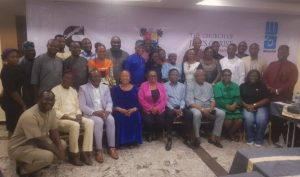Service providers and policy makers in water and sanitation sector have a crucial role to play in the drafting of a regulatory framework that will guarantee safe, reliable and sustainable services to Lagosians.

Dr. Adebayo Alao, Water Aid Lagos Programme Lead, made this submission on Thursday, October 11, 2024, during a “One-Day Parley of WASH Service Providers with LASWARCO” in Lagos.
Speaking on behalf of Evelyn Mere, WaterAid Country Director, Alao said: “We are all are Lagosians by virtue of being Lagos residents or doing business in Lagos, therefore the growth and development of Lagos is a responsibility of all and there are several sectors that make up the Lagos economy, and its environment and one of the key sectors that is very critical to everybody that lives in Lagos is Water, Sanitation and Hygiene. We cannot but take care of sanitation in order not to continue to pollute and contaminate the environment, particularly, again our water. services, it’s very important that we also have adequate care and plan for sanitation.
“Research has established that we can curb diseases that affect the human body by as much as 70% just by mere washing of hands with soap and water. We all know during the period of Covid, how important the issue of hand washing with water and soap was and so I think it’s also critical to our health. Therefore, the Sustainable Development Goal 6 put all these three together and say, every one of us must have access to water, sanitation and hygiene, not just having access to it. We are talking of clean water, water that you can drink, that you can use to cook and use to do your domestic chores and other uses industrially, without putting you at health risk.
“For those that produce water, you must have access to sanitation facilities that does not portend any danger or risk to your health, particularly women and girls. So, all our sanitation facilities must be able to ensure we are using them in good health, particularly women and girls. There are some sanitation facilities that women cannot enter because of the danger or the risk they stand if they enter such facilities. We do not want such facilities in Lagos State and Nigeria as a whole.”
According to Dr. Alao, “Hygiene costs are not with water and sanitation, and that’s why we must combine hygiene with water, at the same time combine hygiene with sanitation. There is what we call the hygiene of water, and that’s what we call water sanitation.
“In hygiene of water, you look at the safety of that water right from the point of source to the point of use, how safe is that water, the source of your water, may be very good, but in the course of transporting it to where you’re going to use it, it may be contaminated, if not well handled. So put all of these together. It is a call for concern, and that is why service providers exist.
“In the course of this service provision government thought it wise that an institution must exist to regulate these services. Otherwise, we will all be kicking against ourselves, and it is not healthy because the environment will be at the losing end. We don’t want that to happen, that is why we are bringing the service providers close to that institution.”
The Lagos Team Lead however urged all stakeholders to put the environment first in all their dealing while charting a way forward in the provision of quality and sustainable services to all Lagosians.
In her submission, Ms Funke Femi Adepoju, Executive Secretary, Lagos State Water Regulatory Commission (LASWARCO), admitted that service providers, stakeholders, policymakers, and advocates are all united by a common goal: to ensure that every citizen of Lagos has access to safe, reliable, and sustainable water and sanitation services.
Adepoju opined that “the challenges we face in the WASH sector are multifaceted, ranging from inadequate infrastructure and funding constraints to environmental concerns and public health risks. It is imperative that we tackle these issues collaboratively, leveraging our collective expertise and experiences.
“This parley serves as a vital platform for us to discuss the regulatory frameworks that govern our operations and explore how we can work together to enhance the effectiveness of these frameworks.
“The role of the Lagos Water Regulatory Commission is pivotal in creating an enabling environment for WASH Service providers, and it is our duty to ensure that regulations foster innovation, accountability, and transparency,” LASWARCO Executive Secretary noted.
Mr. Idowu Olowu, Head of Technical Unit of LASWARCO, enlightened participants on the basic requirements before any individual or organisation can venture into business of Sanitation and Water Service Providers in the state with his paper presentation on “Regulatory Framework Lagos State”.
Highpoint of the event was group discussion on “Challenges for Effective Service Regulation and Proposed Solutions” between the two major groups – Sanitation Service Providers and Water Service Providers.
Notable associations that were represented at the parley include: Boreholes Writers Association of Nigeria, Nigeria Water and Sanitation Association (NIWASA), Water Resources Technicians Association of Nigeria (WRAN) and Water Services Forum.
Others are Association of Table Water Producers (ATWAP), Clean Borehole Water Sellers Association of Nigeria, and Sewage Dislogers Association of Nigeria (SWADAN).
By Ajibola Adedoye
